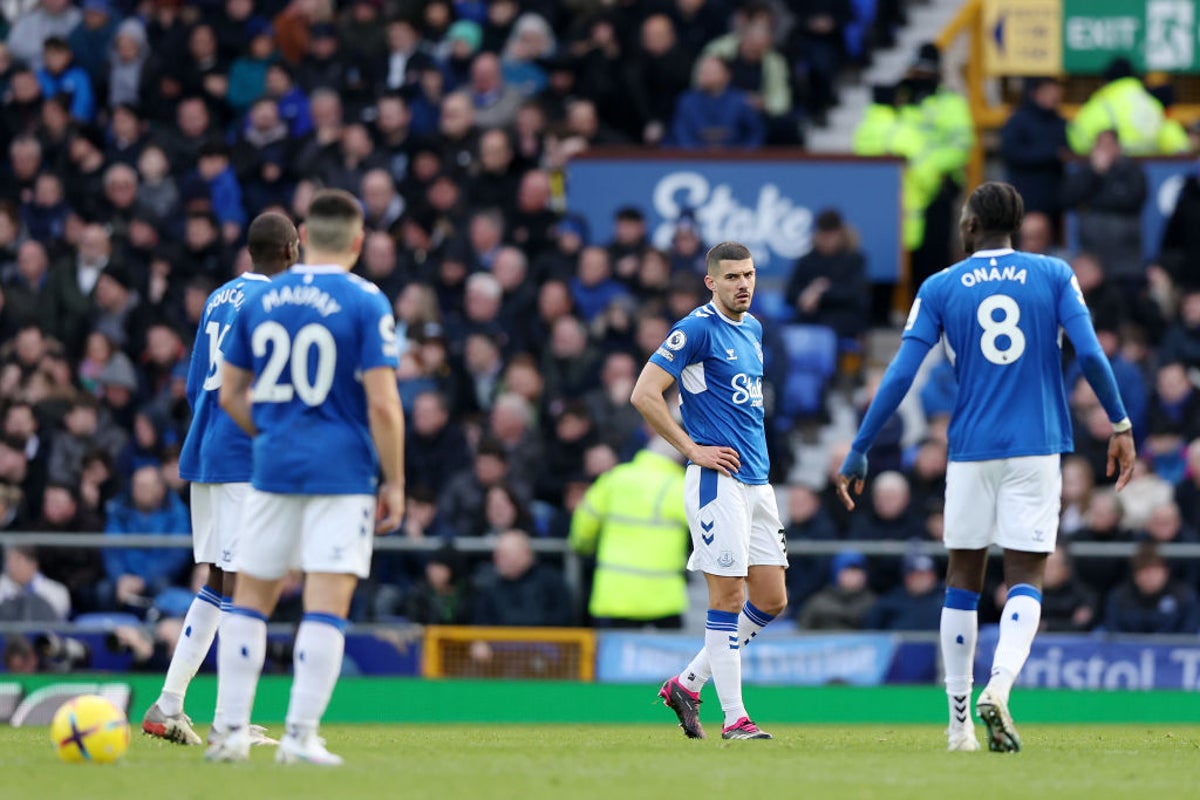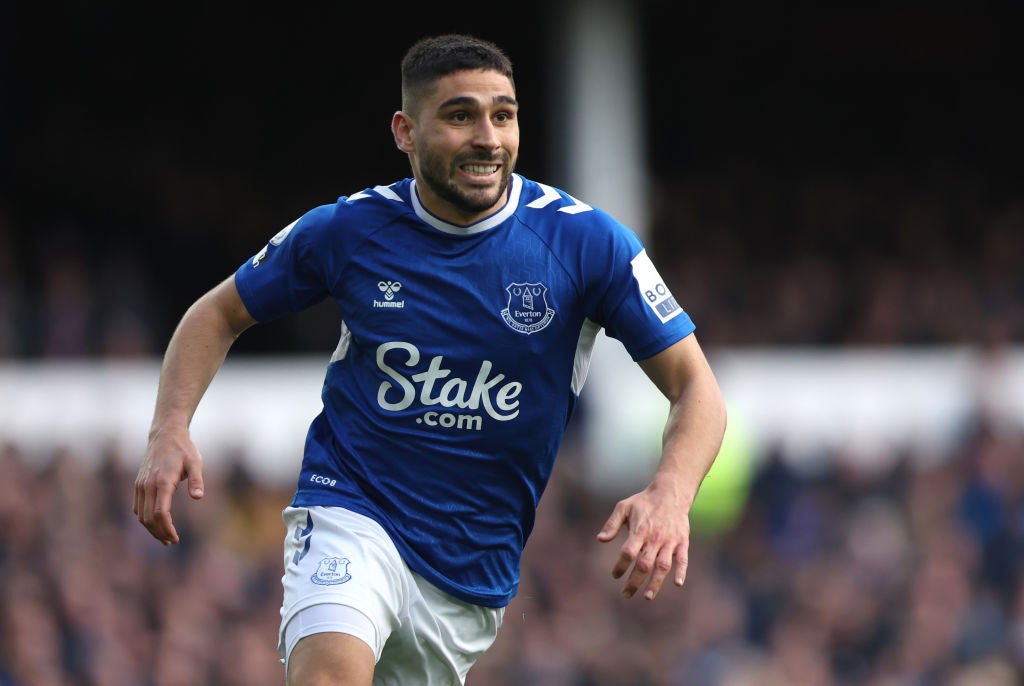
It was in the build-up to a game against Arsenal when Sean Dyche showed Dominic Calvert-Lewin a reel of his goals. He urged the striker to get in the box, between the width of the posts and on the end of crosses. Calvert-Lewin responded with five attempts before half-time.
Not Wednesday’s game against Arsenal, admittedly. Calvert-Lewin is out injured, as he has been for three-quarters of Dyche’s reign and much of Frank Lampard’s. There is no timescale for his return which, given his fitness record since scoring 21 goals for Carlo Ancelotti in 2020/21, may be both depressing and sensible. Predictions of his return can appear optimistic amid seemingly endless absences.
Take out Calvert-Lewin and Everton go into the rematch of Dyche’s debut as the lowest scorers in the Premier League and with the weakest available strike force. They are the only team without a player with at least four league goals this season and one of their pair on three, Anthony Gordon, is now on Newcastle’s books. Specialist strikers have delivered just two. Both goals under Dyche have come from defenders: a freakishly brilliant effort from Seamus Coleman and a set-piece header from James Tarkowski.
A regular refrain of Lampard’s was that he regretted that finances – and Financial Fair Play – forced them to sell Richarlison, though he is yet to open his top-flight account for Tottenham, but the Brazilian has not been adequately replaced. By the time Gordon left at the end of the window, many an Everton target – Danny Ings, Georginio Rutter, Kevin Schade – had gone to clubs who could fund a deal earlier in January; Ings’ decisive brace for West Ham on Saturday indicated what Everton are missing.
Everton’s end of the transfer window was frantic but fruitless. They were arguably both prudent and negligent, reluctant to repeat the mistakes of their past and pay over the odds or bring in players who they did not consider good enough and yet seemingly relying on Calvert-Lewin’s fragile frame to extend their 69-year stay in the top division. Perhaps they were trapped between one false economy and another; certainly they noted that no one activated the €35 million release clause of Beto, the Udinese forward who they had considered and thought overpriced.
But they appointed a manager with a famous preference for 4-4-2. Yet Dyche has had to go to 4-5-1 and only has two fit centre-forwards: Ellis Simms, recalled from loan at Sunderland, suddenly starting a Merseyside derby looked, understandably, out of his depth. Simms at least fits the physical profile of a Dyche striker. Neal Maupay does not: snubbed then, he has been restored to the side, with no impact whatsoever.
Maupay has a lone goal for Everton; he has played 887 minutes since then, enduring a barren run of 17 matches. That he has had a mere 19 shots, with just seven on target, in his drought is an indictment of him, but also reflects a lack of service. Dwight McNeil, who looks rejuvenated since his reunion with Dyche, is a fine crosser whose supply line should suit a fit and firing Calvert-Lewin, but not the smaller Maupay.
Whether out of genuine admiration or a need to praise a player he had signed as other targets eluded Everton, Lampard said he had liked Maupay since his Derby faced Brentford in the Championship. Yet, it if is possible to lose a yard of pace somewhere in the drive from Brighton to Merseyside, Maupay seems to have done.

The tactics may hardly aid his cause and the Frenchman can be distanced from his team-mates but he seems to have inherited Shane Long’s mantle as the Premier League’s king of ineffectual running. Dyche may feeling nostalgic for his old strike duo of Chris Wood and Ashley Barnes.
Now he may have to consider trying something that would be revolutionary for him: picking a winger alone up front. Demarai Gray is the other joint top scorer, even if his meagre tally of three includes a penalty. Illness meant he was not in Dyche’s initial side and continuity has been a theme since then, but Gray’s pace and occasional propensity for the spectacular could at least offer some prospect of a goal.
As it is, the starting 11 against Aston Villa on Saturday had a mere eight between them this season, both at kick-off and the final whistle. If it indicates Everton’s impotence, it also highlights a problem in their haphazard construction of the squad. Their wingers and midfielders are not scorers; Alex Iwobi has 16 goals in 207 Premier League games, McNeil nine in 156, Abdoulaye Doucoure 21 in 202, Idrissa Gueye three in 153, Tom Davies six in 149, Amadou Onana one in 22, Gray 18 in 189. “The team mentality has to be ‘we’re all allowed to score,’” Dyche said. But no one is.
Together with Wolves, Everton have the lowest conversion rate, both in general and for shots on target. Since the start of November, only Chelsea have as few goals, a strangely damning comparison. They have only got more than one in a game twice all season and not since October.
Perhaps it made it imperative to appoint a manager with a proven capacity to get clean sheets. Dyche has proved a few goals can go a long way: his Burnley side finished seventh in 17/18 with 36 goals in 38 games. But even that side had strikers and they got 23 of those 36 goals.
Dyche does not have a record of getting midfielders scoring, even if Burnley’s were restricted by the demands of his regimented 4-4-2. And so Arsenal, beaten by Tarkowski’s header 25 days ago, may think if they just mark a centre-back a bit better at corners they will get a clean sheet.







